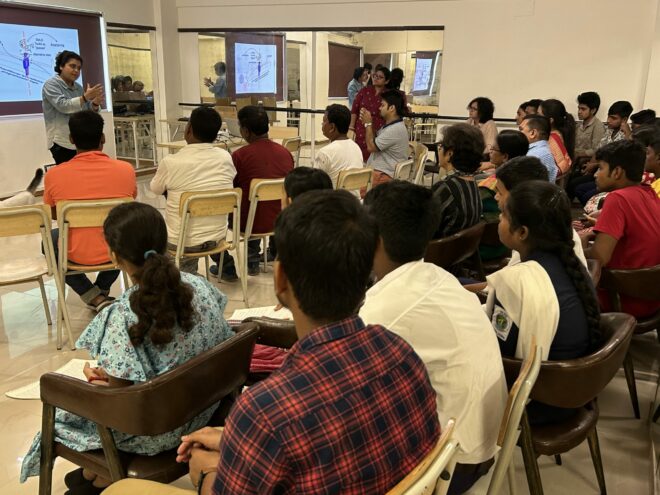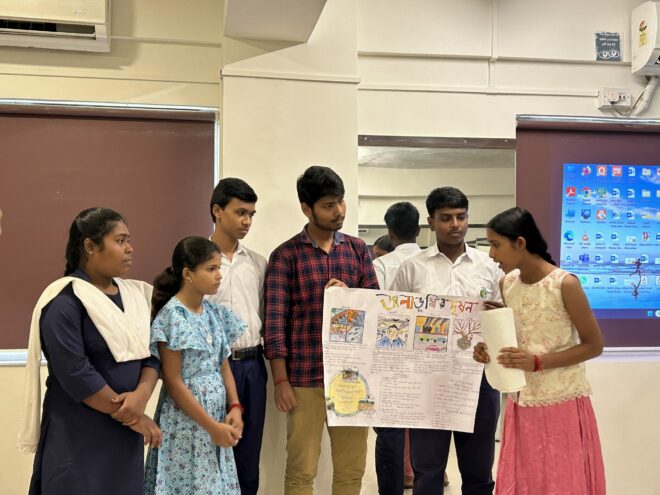The PEIP team on the East Kolkata Wetlands (EKW) – which includes school students from the Bamanghata and Kheadaha high schools, researchers based at the Indian Institute of Technology – Kharagpur (IIT Kharagpur) and members of the Creative Collective Disappearing Dialogues – organized the academia-practitioner engagement workshop in Kolkata on August 27, 2023. The participating practitioners included representatives from the Central Inland Fisheries Research Institute (CIFRI) and three bheris (fisheries) from EKW: the Nalban Fisheries (state-owned), Jhagrashisha (privately managed) and Baro Chaynavi Matsyajibi Samabay Samiti (cooperative). The workshop was aimed at reflecting on the third phase of the PEIP – that is, its actual Practical Empirical Implementation – by focusing on deliberations from the wetlands’ students on their application of the SMUS toolkit in the field. Discussions therefore were centered around how the “SMUS glasses” – i.e. presenting practitioners with an alternative angle wherefrom to see their daily endeavors – may actually provide a deeper introspection of the wetland issues. Exchanges between the students and the invited practitioners also revolved around the scalability and challenges of the method.
The students shared their critical understandings of the “SMUS glasses” and how it helped them to perceive the wetlands as a socio-ecological space embedded with deeper complexities that are often overlooked in mainstream conservation debates. These observations were developed through the various visits to these individual fisheries between March and August 2023. During these visits, the students learnt theories and hands-on application of the methodology by getting exposed to a variety of ethnographic methods (such as participant observations, key informant interviews, focus group discussions) and visualization techniques (such as photo-video coverage, illustrations and sketches) to explore the everyday socioecological realities that shape the wetlands. In other words, by making use of the SMUS toolkit.
Through various innovative and interactive means of engagement, the workshop focused on three themes of urban sustainability – biodiversity, pollution and livelihoods – that traverse this wastewaterscape, whose perception by the students changed distinctively after having employed the SMUS toolkit. Their presentations were based upon their organic reflections of and understandings about the space derived from the first two stages of the PEIP – 1. Data Collection and 2. Analysis – which led to critical insight such as:
“Our wetland is not one space, but a hub of multilayered and heterogeneous entities that many locals are not even aware of…”
“The wetland does not exist to only serve the urban, but to exist, it needs the urban”
Furthermore, the workshop provided a unique opportunity for the multiple stakeholders of the wetlands to come together and reflect upon these deliberations, both individually and also in joint efforts with their peers. Each of the bhery representatives and other practitioners optimized the opportunity to exchange with each other through this academia-practitioner collaborative workshop and share critical feedback on the SMUS toolkit, its applicability and challenges of implementation.
The first session consisted of the theme wise presentations, developed by the students in three groups, with each group having two mentors from IIT Kharagpur and Disappearing Dialogues and 5 to 6 students. Group 1, whose theme was biodiversity, identified four agents of wetlands flora and fauna with the SMUS glasses – fish, water hyacinth, worms and bacteria, that were either simplified or overlooked as part of the EKW biodiversity. They presented a photo-illustration, where they discussed the complex ‘cycle of activity’ between the four agents in increasing the socio-economic and ecological valuation of land and water in the wetlands and nudging towards further ecosystem-based livelihood strategies in the region by local inhabitants. Group 2 presented a video narrative and a sketch on pollution in the wetlands, where they categorized the different aspects of pollution in the region and shed light on the challenge of inorganic waste and lack of awareness on plastic waste management in this space. Their video narrative highlighted the challenges of plastic pollution across the wetlands, which was developed from their interactive visits to the field sites and local community spaces. Group 3 presented their work as an illustrative representation of livelihoods in the wetland region which they classified as fishing and farming activities, with further sub-classifications and also developed a hand drawn bird’s eye view map of the wetland space, showcasing the connectivity of lives and livelihoods in the EKW.
In the second session, the practitioners commended on the innovative methods and conceptual clarity of the young students in understanding the place-based qualities of the region and its people. They also praised the collaborative academia-practitioner platform crafted by the PEIP, that offered them the opportunity to interact not only with the students and academia, but also their inter-intra wetland agential colleagues. They lauded the SMUS toolkit as a necessary apparatus in examining the challenges of the EKW, while briefly reflecting on the need to cross examine and validate the perceived solutions in this dynamic space of practice, in regard to allied challenges and long-term eco-environmental efficacy.
The practitioners were enthused with the collaborative ambit of the project, that introduced them to the impediments faced by other practitioner groups, providing them with an opportunity to craft trajectories of urban sustainability through interaction, fraternization and cross-scalar exchanges amidst and outside the wetland community.









